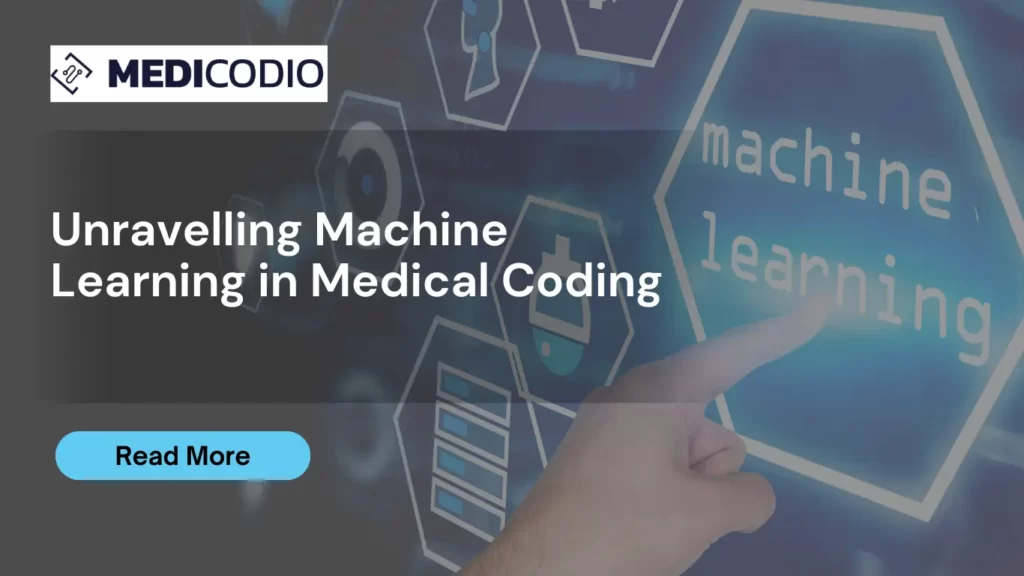Medical coding is one of the important aspects of accurate billing in the healthcare revenue cycle. Traditionally, manual coding of medical documentation has been the norm, but with advancements in machine learning and artificial intelligence, a revolutionary tool has emerged to transform the way medical coding processes are conducted. This article will explore how machine learning in medical coding is transforming the healthcare industry.
The healthcare industry is widely recognized as a vast and complex sector, and one area that adds to this complexity is medical coding. Medical coding involves reading physicians’ notes, checking EMR/EHR records, identifying and assigning correct codes, and then these codes are used to generate claims that are submitted to insurance companies or government healthcare programs for reimbursement. The accuracy of the codes directly impacts the amount of reimbursement the healthcare provider receives.
Medical coding is highly time-consuming and fraught with errors and inefficiencies. As per the Change Healthcare 2020 Denials Index, the percentage of denied claims increased from 9% in 2016 to 11% by the end of 2020.
Medical Coders are under high pressure than ever before as they have to quickly understand complicated medical notes and reduce errors. Physician notes are often unstructured, with incomplete information, spelling mistakes, and complex medical language. Incorrect medical coding can have significant financial implications for patients, potentially leading to increased medical costs and debts. In some cases, inaccurate codes can mislead physicians, impacting patient care. With all this happening around, it’s a no-brainer why medical coders are often included in discussions around coder burnout.
Click to learn more about coder backlog issues.
To solve this problem, MEDICODIO, a healthcare technology company has designed an AI-powered medical coding assistant that will help coders in executing coding processes accurately and efficiently. Our automated medical coding tool allows medical professionals to work on other tasks at a higher precision and faster pace. Wondering, how it is possible. All credits machine learning in medical coding.
Let’s look at how machine learning is used in medical coding.
- ICD code suggestion
Choosing the right code out of 70,000 different codes is not a walk in the park. On top of that, ICD keeps updating and introducing new codes, keeping up with that is another major hurdle for coders.
However, it’s not just a matter of quantity. Medical coders also need to assign the most appropriate codes as each diagnosis or treatment can have different coding options. This aspect presents an ideal opportunity for applying machine learning in medical coding. By leveraging algorithms, it becomes possible to analyze approved claims and identify patterns that assist in assigning the most relevant and financially efficient codes.
- Code Modification
The most challenging aspect of coding lies in dealing with complex scenarios, particularly when it comes to clinically supported conditions with causal relationships. This further underscores the value of applying AI in medical coding. By drawing from past experiences, AI-powered medical coding systems can effectively navigate the intricacies of cross-coding, unraveling the complexities associated with assigning appropriate codes in such cases.
What’s the difference between certified professional coders and AI medical coding?
There is a huge difference in terms of speed and accuracy. Machines with well-fed data can perform 2X times better than certified coders with greater accuracy.
When it comes to speed, humans face a significant challenge in surpassing machines. Medical coders typically require around 15 minutes per chart to complete the coding process. In contrast, machines can accomplish the same task in less than a second.
With such capability, artificial intelligence medical coding tool has taken healthcare to a new level.
How MEDICODIO solves Challenges faced by the Healthcare industry while using AI and machine learning in medical coding?
HIPAA COMPLIANCE: MEDICODIO handles patient data with the utmost security and adheres to HIPAA compliance standards.
DIFFERENT DATA FORMATS: The challenge lies in the widespread use of diverse data formats. MEDICODIO supports all data formats across different software systems, which makes synchronization and integration easy.
MANUAL CODERS: During AI implementation, billers and coders may express concerns about potential job replacement. CODIO is not intended to replace human coders but rather to empower them in their work. While these tools can automate repetitive tasks and enhance coding efficiency, human coders are still essential for complex coding scenarios, clinical judgment, and quality assurance.
DATA TRAINING: Powered by machine learning, CODIO has access to historical data encompassing coded patient charts and processed claims. This data plays a vital role in training the algorithms effectively.
CONTINUOUS LEARNING: Machine learning algorithms continuously learn from new data and internal audits.
CHANGING STANDARDS: While many healthcare organizations currently follow the ICD-10 coding standard, the transition to ICD-11 has already begun. MEDICODIO is designed to adapt to these changing standards to ensure accurate coding practices.
MEDICODIO’s artificial intelligence medical coding tool is the future. AI has swept across all sectors, medical coding field is no exception. Embracing technological advancements is crucial for achieving success and remaining at the forefront of the industry.
Don’t go by our words, experience the capabilities of CODIO firsthand. MEDICODIO now has a 30-day free trial. Try it now.
One of the success stories we’re happy to be part of is Ortmann Healthcare Consulting Services. The healthcare facility was struggling to improve productivity and accuracy in medical coding. Upon using CODIO, an AI-powered medical coding solution, they were able to focus on collections and patient billing. As CODIO automatically suggested accurate codes in a few seconds, they were able to improve productivity and reduce errors.
If you have any inquiries or concerns regarding the implementation of artificial intelligence in medical billing or coding and how it can be applied in your specific context, please don’t hesitate to contact us. We are here to help and address any questions you may have. Contact us.





